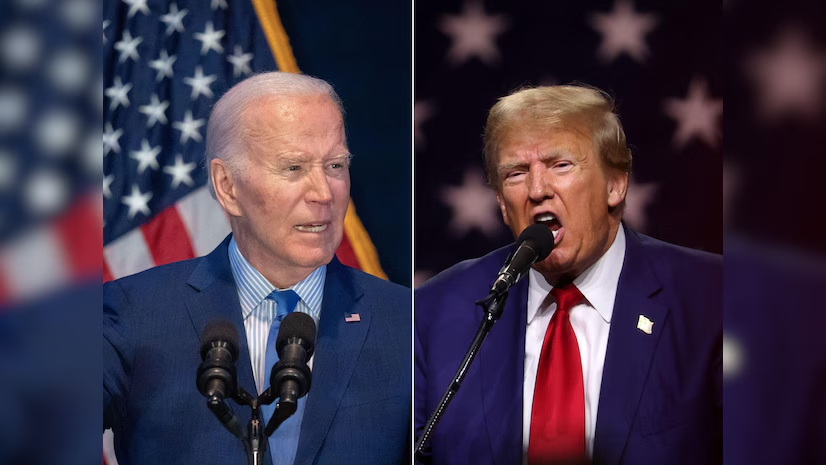Introduction: The Stage is Set
The Trump Biden debate on June 27, 2024, was a highly anticipated event. The stakes were high, with both candidates under immense scrutiny, not just for their policies but also for their ability to effectively communicate and connect with the American people. The debate was held at CNN’s headquarters in Atlanta, and it was anything but ordinary. With no live audience, muted microphones, and strict rules, the atmosphere was tense and charged.
The Age Question: A Double-Edged Sword
Both Biden and Trump have faced questions about their age and fitness for office. At 81 and 78 years old respectively, their performances were closely watched to gauge their readiness for another term. For Biden, the night did little to dispel concerns. His hoarse voice and sometimes tentative answers gave critics more ammunition. Trump, on the other hand, used the opportunity to appear more controlled and presidential, a stark contrast to his past performances.

Biden’s Struggles: A Cold and a Hoarse Voice
President Joe Biden came into the debate with a cold, which affected his voice. This, coupled with moments where he seemed to lose his train of thought, did not help his cause. At one point, while discussing Medicare and tax reform, Biden trailed off, leaving the audience and his opponent puzzled. His performance was described by some as “disaster,” highlighting the difficulties he faced in maintaining a coherent narrative.
Trump’s Strategy: Unleashing the Barrage
Donald Trump came prepared, using his time to unleash a barrage of criticisms, including several well-worn falsehoods. He attacked Biden on various fronts, from immigration to Medicare. His approach was aggressive yet controlled, a strategic move to paint Biden as out of touch and ineffective. Trump’s tactic of throwing rapid-fire accusations, whether true or not, kept Biden on the defensive.

The Personal Attacks: A War of Words
The debate quickly devolved into personal attacks. Biden accused Trump of having “the morals of an alley cat,” referencing Trump’s legal troubles and past behavior. Trump, in turn, mocked Biden for his perceived incoherence, saying, “I really don’t know what he said at the end of that sentence. I don’t think he knows what he said.” These exchanges highlighted the deep-seated animosity between the two candidates.
Key Issues: Inflation and Healthcare
Inflation and healthcare were significant topics during the debate. Biden’s answers were often hurried and disjointed, which Trump capitalized on. Biden tried to pivot to criticize Trump’s handling of the pandemic and the economy, but his points often lacked clarity. Trump’s rebuttals, claiming he had overseen “the greatest economy in the history of our country,” were met with skepticism from Biden, who called out Trump’s exaggerations.
The Moderators’ Role: Keeping Order
Moderators Jake Tapper and Dana Bash had their hands full trying to maintain order. With strict rules in place, including muting microphones, they managed to keep the debate from descending into complete chaos. However, the lack of live fact-checking allowed Trump to repeat several baseless claims unchallenged in real-time, a point of contention for many viewers.

The Impact of No Audience: A Different Dynamic
The absence of a live audience created a different dynamic. The usual energy and crowd reactions were missing, which some believed would level the playing field. Surprisingly, it seemed to benefit Trump, who appeared more focused and less prone to his usual theatrics. For Biden, the lack of a supportive crowd may have contributed to his struggles.
Historical Context: The Oldest Candidates Ever
This debate was historic, not just because of the candidates’ ages but also because it was the first between a sitting president and a former president. The questions were whether Trump could control himself and whether Biden could hold his own. The answers were mixed, with Trump managing to stay composed and Biden struggling to make a strong impression.

The Aftermath: Reactions and Analysis
Reactions to the debate were swift and varied. Some saw it as a significant blow to Biden’s campaign, questioning his ability to go the distance. Others praised Trump’s restraint, a surprising turn for a candidate known for his bombastic style. Analysts debated the long-term impact, noting that while debates rarely decide elections, this one could influence voter perceptions given the candidates’ advanced ages and contrasting styles.
Looking Ahead: The Road to November
The Trump Biden debate was just the beginning of what promises to be a contentious and closely watched election season. Both candidates have their work cut out for them. Moreover, Biden needs to reassure voters of his capability to lead effectively despite his age. Trump needs to continue to project a more controlled image while rallying his base.

Conclusion: A Pivotal Moment
In conclusion, The Trump Biden debate was a pivotal moment in the 2024 election cycle. It highlighted the strengths and weaknesses of both candidates and set the stage for the battles to come. While Biden faced significant challenges, Trump managed to present a more composed version of himself. As the election approaches, both candidates will need to refine their strategies and address the concerns raised during this heated exchange.
Also Read: Amarnath Yatra 2024: Registration, Routes, Safety Measures, and Pilgrim Guidelines
FAQs
1. Why was there no live audience at the debate? The debate was held without a live audience to prevent disruptions and ensure a more controlled environment.
2. How did Biden’s cold affect his performance? Biden’s hoarse voice and moments of incoherence were attributed to a cold, which negatively impacted his performance.
3. What were the main topics discussed during the debate? Key issues included inflation, healthcare, immigration, and the candidates’ past performances and behavior.
4. Did the moderators fact-check the candidates in real-time? No, the moderators did not fact-check the candidates in real-time, which allowed some false claims to go unchallenged during the debate.
5. How did the lack of an audience affect the debate dynamics? The absence of an audience created a different dynamic, potentially benefiting Trump by reducing the usual theatrics and allowing for a more focused exchange.







